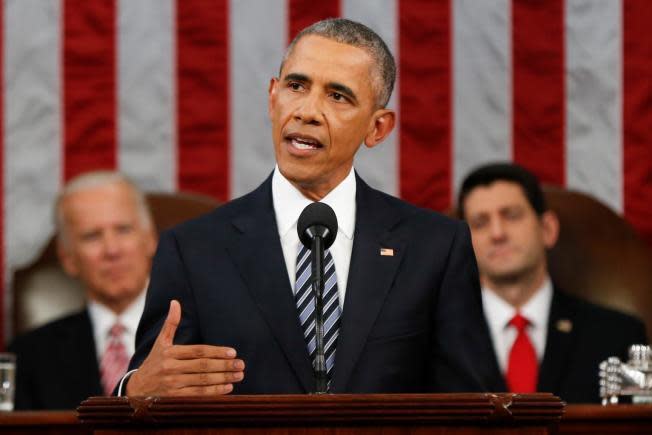Obama's State of the Union, A Review: Hopes, Regrets, Warnings

President Obama’s final State of the Union address was marked by an informality, bluntness, and — relatively speaking — brevity rare for such speeches. With Speaker of the House Paul Ryan and Vice President Joe Biden seated behind him, Obama began with a joke and ended with a full-throated cry to “fix our politics.”
You could almost hear the groans of the broadcast networks as ABC, CBS, and NBC did that rare thing — interrupted their usual programming of sitcoms, reality shows, and dramas to cover the workings of government in primetime. (ABC, petrified that viewers might become bored, kept a running list along the left side of the screen, ticking off Obama’s subjects, much like ESPN’s Pardon the Interruption.) Over on cable news, CNN was doing its own kind of pandering, running its own poll along the bottom of the screen: “Do You Agree With President Obama? Vote on CNN.com/pulse!”
The cameras panned across the audience regularly, picking up guests present, such as Kentucky clerk Kim Davis, and four-year-old Logan Barritt, the youngest VIP officially invited to the State of the Union. The Wisconsin kid raided his piggy bank to send Christmas presents to soldiers stationed overseas. House Speaker Ryan invited him, saying that Logan shows that “kids can be heroes, too.”
In remarks that Fox News anchor Bret Baier characterized as “taking swipes at GOP candidates, just not by name,” Obama asserted that “maybe the most important thing I want to say tonight… [is that we must] fix our politics. … Our public life withers when only the most extreme voices get attention.” In words that could be interpreted as direct criticism of Donald Trump’s campaign rhetoric, Obama said, “It’s one of the few regrets of my presidency that the rancor and suspicion between the parties has gotten worse instead of better… we need to reject any politics that targets people because of race or religion. This isn’t a matter of political correctness. It’s a matter of understanding what makes us strong… When politicians insult Muslims, whether abroad or our fellow citizens, when a mosque is vandalized, or a kid bullied, that doesn’t make us safer. That’s not telling it like it is. It’s just wrong.”
In the official Republican response following Obama’s speech, South Carolina governor Nikki Haley chided the President, saying his “record has often fallen far short of his soaring words.” Interestingly, Haley echoed Obama’s sentiments at one point, taking her own veiled jab at Trump’s anti-immigration remarks when she noted, “Immigrants have been coming to our shores for generations to live the dream that is America. During anxious times, it can be tempting to follow the siren call of the angriest voices. We must resist that temptation. No one who is willing to work hard, abide by our laws, and love our traditions should ever feel unwelcome in this country.”
Haley came off well. And if you think this is an easy little speech to pull off, bear in mind that her predecessors have sometimes stumbled in the court of public opinion. In 2013, for example, Marco Rubio became a figure of fun — even the subject of a Saturday Night Live sketch — when he paused to take a water break in the middle of his brief speech.
The cameras showed us once again how divided the Congress is, with Democrats rising frequently to applaud as Republicans sat on their hands. During those years when a Republican is President, the reverse is often true. But goodness gracious, can’t both parties agree to applaud a few things unanimously? I mean, if you can’t clap heartily when the President invokes the name of astronaut Sally Ride — what’s “partisan” about that?
The cameras also picked up the fact that three Supreme Court justices declined to attend the President’s address: Justices Clarence Thomas, Samuel Alito, and Antonin Scalia. The trio also skipped the president’s address last year, and in 2013, Scalia called the event “a childish spectacle.” Tuesday night’s State of the Union spectacle wasn’t childish, but rather a display of adults disagreeing with each other with renewed passion on both sides.


